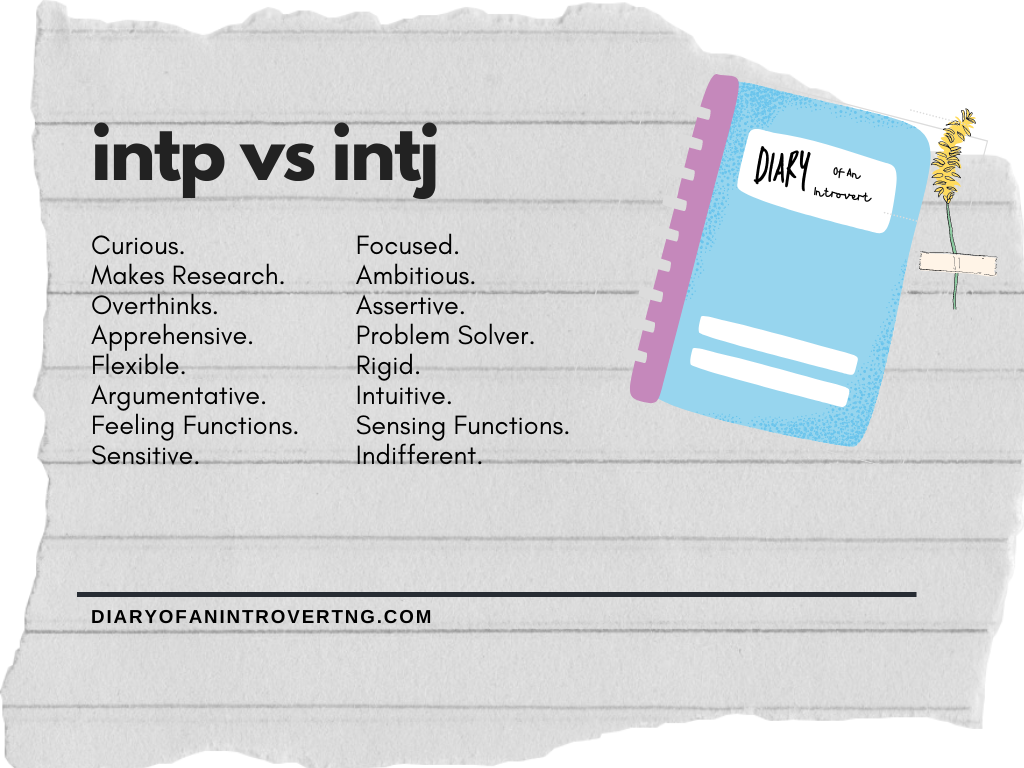8 Great Examples to Understand the INTP vs INTJ Comparison
Photo by Leah Hetteberg on Unsplash
“Am I an INTJ or INTP?”
If you’re asking this question, this article is the best INTP vs INTJ test to help you identify your true character traits, then you’re in the right place.
The INTP personality type might seem similar to the INTJ personality for many reasons.
This is mostly because the 16 personalities INTP consists of the introverted, intuitive, thinking, and prospecting characters, while the INTJ personality has the introverted, intuitive, thinking, and judging characters.
Although these two personalities have similar traits, the INTP cognitive functions are quite different from the INTJ cognitive functions.
This article uses the basic knowledge of their core brain functions to provide you with eight simple examples to tell the INTP and INTJ personalities apart.
8 Ways to Identify the INTP vs INTJ Differences
Focused vs Curious Mind.
If you’re wondering, “Am I an INTP or INTJ?'' the best way to find out is by observing how your mind operates. If you’re often curious, then you must be an INTP. On the contrary, having a focused mind makes you more of an INTJ. This disparity happens because of the INTP vs INTP thinking cognitive functions.
An INTP’s dominant function is Introverted Thinking (Ti), which means they prefer making decisions internally, and without external factors. Therefore, these individuals tend to think more, speculating on several subjects and trying to find the best answer to a question.
On the contrary, an INTJ’s auxiliary function is Extroverted Thinking (Te), which is focusing on facts, workable strategies, and things happening in real-time to make judgments. This factor tends to make INTJs more precise in their decisions.
2. Ambitious vs Making Research.
Both INTP and INTJ people are intuitive thinkers. They have a unique perspective about several subjects than most individuals, and tend to think outside the box. They’re also constantly ruminating over new, important topics, which is why the INTP vs INTJ intelligence is commonly debated.
However, INTJ’s tend to be more ambitious. They have a strong will to use their abilities to produce results. Since they have focused minds, they tend to stick to workable strategies until they achieve their results.
On the other hand, INTP people are more concerned about making research and finding the best game plan that resonates with them. This process often prevents them from bringing their thoughts to reality. They would rather brainstorm until they find what can work best.
3. Assertive vs Overthinking.
Another major INTJ vs INTP comparison is how these individuals feel about influencing other people’s decisions. If you’re wondering whether you're an INTJ or INTP, you should assess how confident you are in advising others.
INTJs are confident about the decisions they make, merely because of the effort they put into their research. Therefore, they are assertive about influencing other people's choices. People also tend to look up to them for advice because of how competently they give it.
On the other hand, INTPs tend to overthink their own decisions because they love brainstorming on the several options they have. Therefore, they won’t be confident influencing other people’s decisions, and would mostly refrain from it.
Related: Am I Too Quiet? P.S. No, You’re Not. A How-To Guide to Using Your Introversion to Your Advantage
4. Problem-solving skills vs Apprehension.
Another INTP INTJ difference is how these individuals tackle complex situations. If you want answers to the question, “Am I INTP or INTJ?” pay attention to how your mind functions during tough moments. Are you more concerned about understanding a problem first or trying to solve it right away?
INTP people tend to have deep insight into matters. They would rather understand a complex situation before diving in to solve the problem. Although INTPs have higher cognitive processes, they can become paralyzed in their thought process to the extent they fail to take action.
INTJ people, on the other hand, are analytical and practical. Their dedication to get things done often make them natural problem solvers. They would work tirelessly until they find a solution to a problem. Nonetheless, failing to be perceptive can delay that process.
5. Rigid vs Flexible.
Another INTP INTJ difference that might be easy to spot is how receptive these personalities are to other people’s opinions. An INTJ or INTP test you can do on yourself is to observe how firm you are about your decisions and when other people tell you what to do.
INTJ people tend to be rigid because of how self-assured they are about their strategies and vision. They are not easily receptive to other people’s opinions except when it produces tangible results. Therefore, these individuals might seem hard to work with, or even arrogant.
INTP people, on the other hand, tend to be more flexible. They enjoy discussing theories and ideas, even though they may not readily approve of them. The mere fact that they can rub minds with other people is thrilling to their souls.
6. Intuitive vs Argumentative Conversations.
If you’re wondering whether you’re INTJ or INTP, you can tell by the type of conversations you have with other people. Although the INTP and INTJ personality types seem similar, these individuals interact much differently.
An INTJ’s dominant cognitive function is Introverted Intuition (Ni). People with this personality type tend to have deep insight about matters, and therefore, stir up intriguing discussions whenever they can. They enjoy interacting with like minds so that their conversations can be productive.
An INTPs dominant cognitive function is Introverted Thinking (Ti), which is making decisions internally without focusing on external factors. Therefore, INTP people need to personally approve theories before accepting them. This can make them seem somewhat argumentative during discussions.
7. Feeling vs Sensing Functions.
Another major INTJ INTP difference is in their auxiliary cognitive functions. These are the parts of their brains that bring relief. When people engage in activities with their auxiliary functions, they consider these actions to be stress-free. To determine whether you're an INTP or INTJ, you should observe how you behave when you’re pretty tense.
For an INTJ, their auxiliary function is Introverted Feeling (Fi). Therefore, when they feel burned out, they tend to focus on making emotional decisions that will affect them personally. They look at pleasure from an internal point of view and might please themselves before appeasing others.
For an INTP, their auxiliary function is Introverted Sensing (Si). They’d lean more to their memories to feel relieved when they’re stressed. Some of the activities they might enjoy doing is trying to learn from past mistakes or recollecting their favorite places and people.
Liking this article? Join our Introvert Club→
8. Indifferent vs Sensitive.
Due to the self-assured nature of INTJs, they hardly care what other people think about them. Even if a person agrees with their strategies, they’re more concerned about the results (Ti). Therefore, praises without proof, or condemnation without evidence, often don't affect them.
INTPs, on the other hand, are more sensitive to other people’s criticism, especially when it challenges their thought processes. They have Extroverted Feeling (Fe) as one of their core functions, and they unconsciously seek approval for the internal theories they come up with.
Related: 5 Easy Hidden Things Each Introverted MBTI Needs in Relationships
Still asking, “Am I INTJ or INTP?” The best INTP or INTJ test is observing how other people’s opinions affect you. Your cognitive functions will help you know whether you’re indifferent or quite sensitive.
FAQs
Is INTP more intelligent than INTJ?
There isn’t enough evidence to debate on the INTP vs INTJ intelligence. So if you’re asking, “Are INTPs smarter than INTJs?” the best answer is that both personality types are quite intellectual. More so, they have rare minds that contribute greatly to the world.
What’s the major difference in INTJ vs INTP humor?
INTPs tend to take a lighter and quirkier approach to humor. You’ll know when they’re trying to tell a joke, unlike INTJs. INTJ people take a darker or more sarcastic approach, to the extent people think they don't have a sense of humor.
Can you be both INTP and INTJ?
If you’re wondering, “Can I be both INTP and INTJ?” the answer is no. If you took the Myers-Briggs Personality Test multiple times, and it gave you conflicting results, it’s usually because of inexact metrics, and not because you have two personalities.
Which is more emotional INTP or INTJ?
INTPs and INTJs feel the same amount of emotion but utilize it differently. INTJs internalize their emotions and are more aware of how they feel (Fi), while INFPs look at their feelings from an external point of view (Fe).
How can you tell INTJ from INTP apart?
You can tell an INTJ and INTP apart through social interactions. INTJs usually don’t want to interact with others because they consider it a distraction from achieving their goals. However, INTPs are more thrilled to rub minds and brainstorm with other people.
Live Your Best Quiet Life
Get the Am I Too Quiet? book →
CONCLUSION
Did you enjoy this article? Looking at these examples will give you a clearer picture of whether you’re an INTP or INTJ. Kindly leave a comment below if you liked this article, or share it with others.















